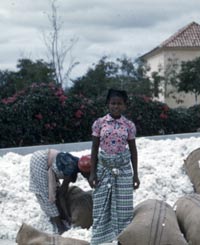“The poetry of Africa…”

Dear Deolinda,
Poetry.
 I began this whole series of letters or reflections or whatever it turns out to be, by quoting your poem “Mother Africa.”
I began this whole series of letters or reflections or whatever it turns out to be, by quoting your poem “Mother Africa.”
Then your old friend Loid’Ana sent me a copy of your poem about Luanda, written in 1956, that was such an ironical twist on the recent USA Today supplement focusing on modern-day Angola and its fast-growing and competitive economy.
Today, going back into my Angola memorabilia, I pulled out very old and brittle copies of O Estandarte, saved all these years, and, lo and behold, there were copies of poems by Loid’Ana and one by your brother Roberto.
To add to that amazing collection of the bard at work in Angola, I found an excerpt from our Baltimore Sun newspaper dated January 17, 1976, featuring a number of articles about Angola and threats of war from Zaire after an attack by the MPLA. Those are stories for another occasion, but the one that caught my eye in the midst of all the awareness about poetic expressions from you and others was this headline: “Elite African, a doctor-poet, made MPLA today’s power.”
The MPLA (explained in English to the readers as The Popular Movement for the Liberation of Angola) was attacking Western-backed forces in Angola’s civil war, as mentioned in other parts of the newspaper.
The article went on to describe the formation of the MPLA political party in Luanda in 1956. Its headquarters were eventually moved to Brazzaville in the Congo Republic, and it was in that locale that your own story came to an end, under circumstances brutally testing your courage.
Your much older cousin, Dr. Agostinho Neto--another of the bright young people educated by the Methodist mission and given a scholarship for medical studies in Lisbon--as a student wrote anguished poetry about the tragedies suffered by the people in Angola at the hands of the colonial Portuguese.
Understandably, the Portuguese didn’t appreciate his poetry, and considered his writing seditious. In and out of prisons, and subjected to inhumane treatment, his popularity back in Africa grew.
While he was still a student, he became active in the cause of the MPLA, and was elected president of that political organization in 1962. When he returned to Luanda in 1974 to start his medical practice, thousands of people welcomed him enthusiastically.
When the Portuguese eventually lowered their flags over Luanda for the last time in 1975, marking the end to their 500-year rule over the nation named after King Ngola, Neto had just been named President of the People’s Republic of Angola.
By then, he was known as a “revolutionary” poet; other times, “The Marxist Poet.”
As you must know, Deolinda, in the early years of his leadership, Agostinho’s appeals for help from the U.S. were turned down, supposedly because of his Communist leanings, in an era when Americans were fearful there was a Communist behind every tree. That was the time of our McCarthy hearings, and any perceived association with the dreaded Reds was to be avoided at all costs.
So then he appealed to the Soviet Union for aid. That began an era of arms supplied by the Soviets, aided and abetted by Cuban forces.
In 1979, twelve years following your violent death, Agostinho died after a long struggle with cancer, leaving behind a legacy of leadership stoked by his own passion for the people of Africa.
And so, my poetic friend, how do we measure the influence of these expressions from the vivid imaginations and hearts that you and other Angolan writers dared put into words? Your dreams of a better life for your people were shaped in the crucible of all those years of anguish and loss, and continue to be part of the thought and soul of generations who follow you.
